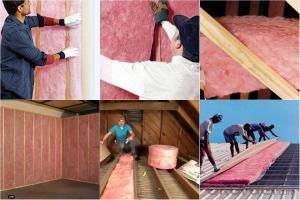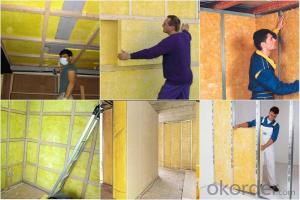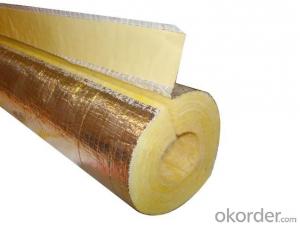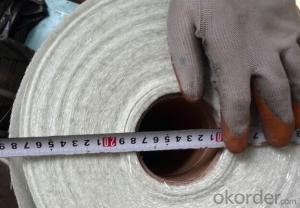Best Price Fiber Glass Wool Tube Insulation 50mm 70kg/m3
- Loading Port:
- Tianjin
- Payment Terms:
- TT OR LC
- Min Order Qty:
- 5000 m²
- Supply Capability:
- 20000 m²/month
OKorder Service Pledge
OKorder Financial Service
You Might Also Like
1.Description of Glass Wool Blanket:
At the system HOT END, the raw materials are dosed, mixed, melted, fiberized, impregnated with a special binder and formed into a primitive mat of very fine fiber glass. Continuous conveyors transport the mat to the COLD END of the plant for binder polymerization. The product is then cut to shape and packed for shipping.
Glass wool blanket, glass wool board, glass wool pipe, which made from glass wool, largely use in construction, chemical, electronic, electricity, metallurgy, energy industry and community with good performance in heat preservation, heat insulation, sound absorption.
2.Main features of Glass Wool Blanket:
1) Heat-preservation and heat-insulation, sound absorption and noise reduction
2) Damp proof property
3) Excellent fire proof performance
4) Thermal stability, high temperature heat-stability, durability, high temperature shrinkage resistance
3.Glass Wool Blanket Images:
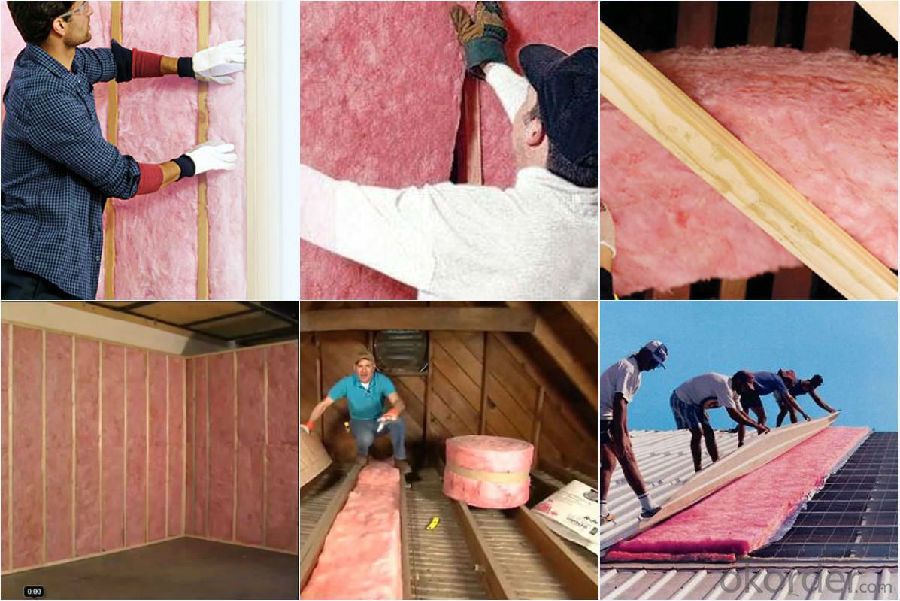
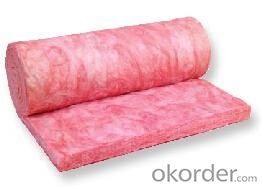
4. Glass Wool Insulation Blanket Technical Parameters:
Property | High/low temperature resistance, oil and fuel resistance, weathering resistance, O zone resistance etc. |
Shape | According to your requirement. |
Color | Any color is available ,according to your requirements. |
Material | NBR, CR, SBR, EPDM, IIR, NR, EP, Silicone, VITON etc. |
Hardness | 30-90ShoreA |
Delivery | In 10 days |
Packing | Plastic bag & carton box or according to your requirements. |
Application | Electronic field, industrial machine & equipment, house-hold appliance, telecommunication, automobile, medical equipment industry etc. |
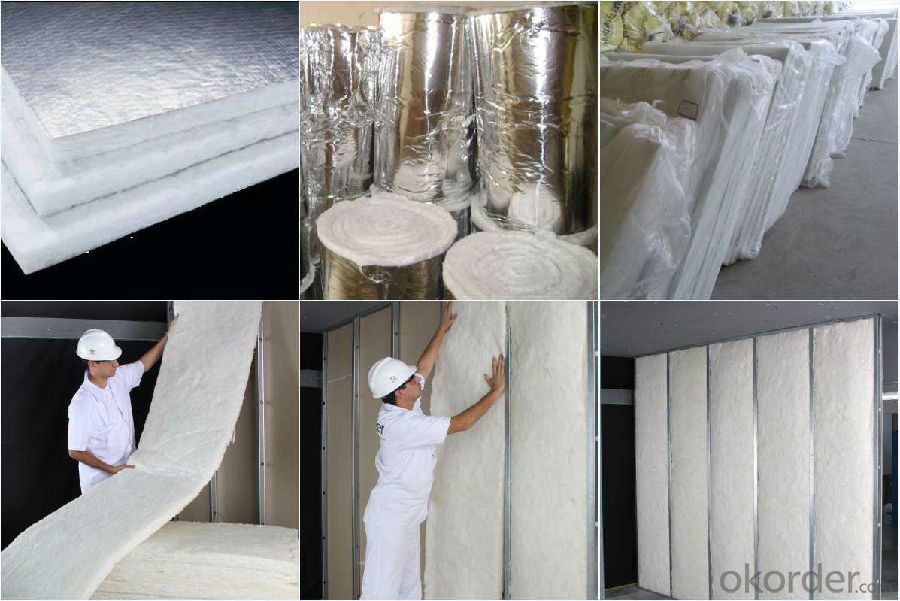
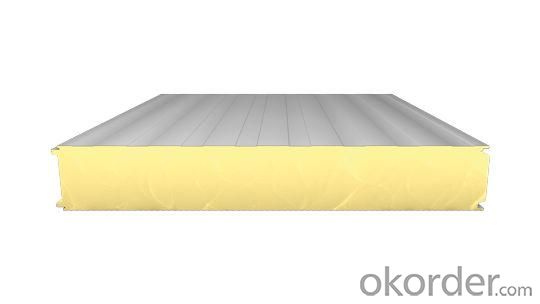
5.FAQ
We have organized several common questions for our clients,may help you sincerely:
①How about your company?
A world class manufacturer & supplier of Glass Wool Blanket is one of the large scale professional investment casting production bases in China,consisting of both casting foundry forging and machining factory. Annually more than 8000 tons Precision casting and forging parts are exported to markets in Europe,America and Japan. OEM casting and forging service available according to customer’s requirement.
②How to guarantee the quality of the products?
We have established the international advanced quality management system every link from raw material to final product we have strict quality test; We resolutely put an end to unqualified products flowing into the market. At the same time, we will provide necessary follow-up service assurance.
- Q:How does the fiber content of fiberglass mat tissue affect its strength?
- The fiber content of fiberglass mat tissue directly affects its strength. The higher the fiber content, the stronger the fiberglass mat tissue will be. This is because the fibers provide the structural integrity and reinforcement to the material. When the fiber content is increased, it results in a higher concentration of fibers, which in turn increases the overall strength of the tissue. Fiberglass mat tissue is composed of glass fibers that are randomly oriented and bound together with a resin binder. These fibers are responsible for carrying the load and providing resistance to any external forces or stresses applied to the material. As a result, the more fibers present in the tissue, the greater the load-carrying capacity and strength of the material. Additionally, a higher fiber content enhances the stiffness of the fiberglass mat tissue. Stiffness refers to the ability of a material to resist deformation or bending under applied loads. With a greater amount of fibers, the tissue becomes stiffer, making it less prone to bending or flexing. This increased stiffness contributes to the overall strength of the material. It is important to note that while a higher fiber content improves the strength of fiberglass mat tissue, there is an optimal range where the benefits of additional fibers are maximized. Beyond this range, the increased fiber content may not result in a significant improvement in strength, and it may have diminishing returns. Therefore, it is crucial to find the right balance between fiber content and strength for specific applications. In conclusion, the fiber content of fiberglass mat tissue directly impacts its strength. Increasing the fiber content leads to a higher concentration of fibers, which enhances the material's load-carrying capacity and stiffness. Finding the optimal fiber content is essential to maximize the strength of the tissue for specific applications.
- Q:How does fiberglass mat tissue compare to spray foam insulation?
- Fiberglass mat tissue and spray foam insulation are two different types of insulation materials with their own unique characteristics and benefits. Fiberglass mat tissue is a type of insulation made from woven strands of fiberglass. It is typically used in applications where thermal insulation is required, such as in walls, roofs, and attics. Fiberglass mat tissue is known for its high resistance to heat transfer, making it an effective insulator. It is also fire-resistant, which adds an additional safety benefit. On the other hand, spray foam insulation is a type of insulation that is applied as a liquid and expands into a solid foam. It can fill in small cracks and gaps, creating an airtight seal, which makes it an excellent choice for preventing air leakage and reducing energy loss. Spray foam insulation is also known for its excellent soundproofing qualities. In terms of installation, fiberglass mat tissue usually comes in large rolls or batts that need to be cut and fitted into place. It requires careful handling to ensure proper installation and may require the use of protective equipment, such as gloves and masks, as the fibers can cause skin and respiratory irritation. Spray foam insulation, on the other hand, is applied using specialized equipment that sprays the liquid foam onto the desired surface. It expands quickly, filling in any gaps or voids, and hardens within a short period of time. This makes it a more convenient option for insulating hard-to-reach areas or irregularly shaped spaces. When comparing the two, fiberglass mat tissue is generally more cost-effective, as it is less expensive to purchase and install compared to spray foam insulation. However, spray foam insulation provides better air sealing and can offer higher energy savings in the long run. In summary, fiberglass mat tissue and spray foam insulation have their own advantages and are suited for different insulation needs. Fiberglass mat tissue is a good option for thermal insulation, while spray foam insulation excels in air sealing and soundproofing. The choice between the two ultimately depends on factors such as budget, desired insulation performance, and the specific requirements of the project.
- Q:Can fiberglass mat tissue be used for making swimming pool shells?
- Swimming pool shells can indeed be constructed using fiberglass mat tissue. This material, widely used in the construction and manufacturing industries, possesses remarkable qualities. By combining fine glass fibers with a resin binder, it becomes a lightweight and pliable substance. The utilization of fiberglass mat tissue in swimming pool shell fabrication yields numerous advantages. Primarily, its exceptional resistance to water enables it to excel in pool applications. It also withstands the effects of common pool chemicals like chlorine, ensuring the longevity of the shell. In addition, fiberglass mat tissue is highly adaptable and can be molded into various shapes and sizes. This permits the creation of bespoke swimming pool shells that cater to specific requirements and preferences. Its flexibility also enables it to endure ground movement and temperature changes, thereby guaranteeing the pool shell's structural integrity. Moreover, fiberglass mat tissue boasts a smooth surface finish, providing both visual and tactile appeal. It can be easily painted or coated with gel coats to enhance its appearance and safeguard it from harmful UV rays, preventing discoloration and deterioration over time. In conclusion, fiberglass mat tissue emerges as an exceptional option for constructing swimming pool shells due to its water and chemical resistance, flexibility, durability, and aesthetic appeal.
- Q:How is fiberglass mat tissue used in the production of chemical reactors?
- Due to its exceptional properties, fiberglass mat tissue is commonly utilized in the production of chemical reactors. Composed of randomly oriented glass fibers bonded together with a binder material, this tissue is ideal for constructing these reactors. A primary application of fiberglass mat tissue in chemical reactors is as a reinforcement material. It is typically applied to the inner surfaces of the reactor to enhance its structural integrity. The combination of glass fibers and binder creates a durable and strong layer capable of withstanding harsh conditions within the reactor, such as high temperatures and corrosive chemicals. Moreover, fiberglass mat tissue acts as a protective barrier against chemical attack. Traditional materials often degrade when exposed to aggressive substances found in chemical reactors. However, the chemical resistance of fiberglass mat tissue makes it highly suitable for such environments. It effectively prevents corrosive chemicals from penetrating the reactor walls, ensuring the long-lasting reliability of the equipment. Additionally, fiberglass mat tissue offers thermal insulation properties to chemical reactors. This is particularly crucial in processes where temperature control is vital. The insulation capabilities of the tissue help maintain the desired temperature within the reactor, preventing heat loss or gain that could negatively impact the efficiency and consistency of chemical reactions. In conclusion, fiberglass mat tissue plays a vital role in the production of chemical reactors by reinforcing the structure, providing chemical resistance, and offering thermal insulation. Its unique properties make it an excellent choice for ensuring the durability, safety, and optimal performance of chemical reactors in various industrial applications.
- Q:What is the flexural strength of fiberglass mat tissue?
- The flexural strength of fiberglass mat tissue refers to its ability to resist bending or flexing without breaking. It is typically high due to the reinforcing properties of the fiberglass material, making it suitable for applications requiring structural integrity and resistance to deformation.
- Q:How does fiberglass mat tissue perform in terms of thermal conductivity?
- Fiberglass mat tissue exhibits excellent thermal conductivity performance. Its fine glass fibers composition contributes to a low thermal conductivity value, resulting in effective heat transfer insulation. The interwoven fibers form a barrier that hinders heat movement, making it a highly suitable material for thermal insulation purposes. Moreover, the mat tissue is frequently combined with binders or coatings to enhance its thermal resistance characteristics. In summary, fiberglass mat tissue is a dependable option for reducing thermal conductivity and delivering insulation across diverse industries and applications.
- Q:What is the typical thickness of fiberglass mat tissue?
- The typical thickness of fiberglass mat tissue can vary depending on the specific application and intended use. However, it is commonly available in thicknesses ranging from 0.5mm to 3mm. The choice of thickness is determined by factors such as the desired strength, flexibility, and absorption properties required for the particular project or product being manufactured. Thicker fiberglass mat tissue is generally used for applications that require higher levels of strength and durability, while thinner tissue is suitable for more lightweight and flexible applications.
- Q:Does fiberglass mat tissue require any special precautions during storage?
- Special precautions are necessary when storing fiberglass mat tissue. Fiberglass is a delicate material that can easily be damaged if not stored correctly. Here are some precautions to keep in mind: 1. Maintain dry conditions: It is important to store fiberglass mat tissue in a dry, moisture-free environment. Excessive moisture can compromise its strength and integrity. 2. Avoid direct exposure to sunlight: The UV rays from sunlight can gradually degrade fiberglass. To prevent damage, store the material in a cool, shaded area away from direct sunlight. 3. Shield from dust and dirt: To maintain its effectiveness, fiberglass mat tissue should be stored in a clean, dust-free environment. Dust and dirt particles can become embedded in the material and reduce its efficiency. 4. Steer clear of extreme temperatures: Extreme heat or cold can also have an impact on the quality of fiberglass mat tissue. It is advisable to store it in an environment with controlled temperatures to prevent any potential damage. 5. Proper packaging: If the fiberglass mat tissue comes with packaging, it is recommended to keep it in its original packaging for added protection. If not, consider using a durable, moisture-resistant wrapping material. By adhering to these precautions, you can ensure that your fiberglass mat tissue remains in optimal condition during storage and is ready for use whenever necessary.
- Q:Can fiberglass mat tissue be used for making lightweight furniture?
- No, fiberglass mat tissue is not typically used for making lightweight furniture. It is primarily used as a reinforcement material in applications such as insulation, automotive parts, and construction, but not for furniture production.
- Q:Is fiberglass mat tissue biodegradable?
- Fiberglass mat tissue does not possess biodegradable properties. It is an artificial substance composed of delicate glass fibers intricately interwoven to form a resilient and long-lasting material. These fibers do not undergo natural decomposition, rendering fiberglass mat tissue to be non-biodegradable.
1. Manufacturer Overview |
|
|---|---|
| Location | |
| Year Established | |
| Annual Output Value | |
| Main Markets | |
| Company Certifications | |
2. Manufacturer Certificates |
|
|---|---|
| a) Certification Name | |
| Range | |
| Reference | |
| Validity Period | |
3. Manufacturer Capability |
|
|---|---|
| a)Trade Capacity | |
| Nearest Port | |
| Export Percentage | |
| No.of Employees in Trade Department | |
| Language Spoken: | |
| b)Factory Information | |
| Factory Size: | |
| No. of Production Lines | |
| Contract Manufacturing | |
| Product Price Range | |
Send your message to us
Best Price Fiber Glass Wool Tube Insulation 50mm 70kg/m3
- Loading Port:
- Tianjin
- Payment Terms:
- TT OR LC
- Min Order Qty:
- 5000 m²
- Supply Capability:
- 20000 m²/month
OKorder Service Pledge
OKorder Financial Service
Similar products
New products
Hot products
Hot Searches
Related keywords
